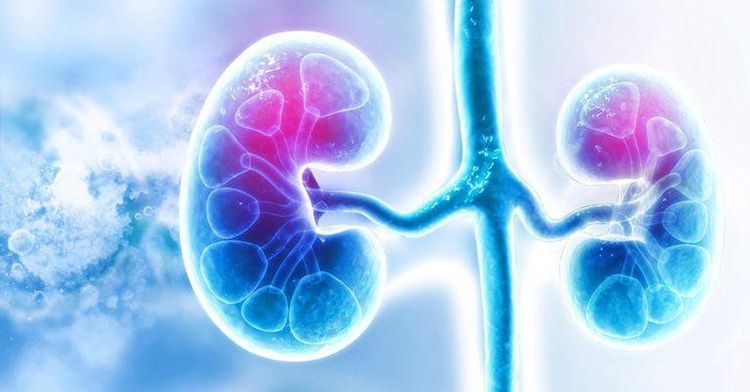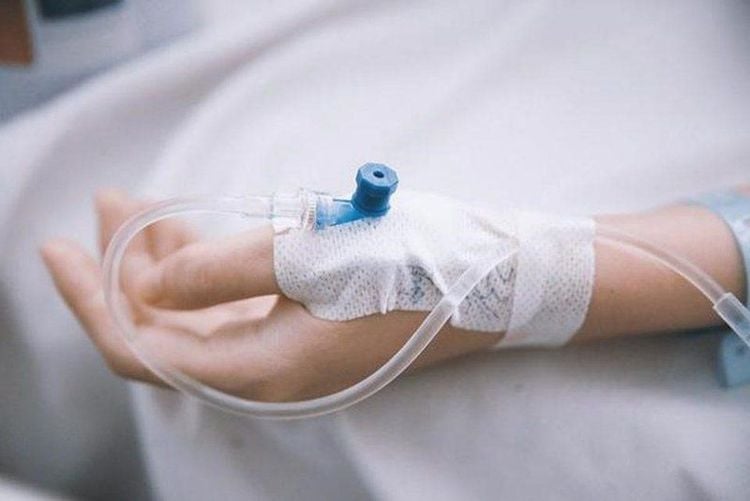This is an automatically translated article.
Hypernatremia is a common electrolyte disorder defined as serum sodium levels in excess of 145 mmol/L. However, hypernatremia is not only a matter of sodium homeostasis but is also associated with a decrease in total body water, which is common in the elderly, debilitated, or severe acute infections.
1. What is hypernatremia?
Hypernatremia is when sodium levels rise above the normal physiological limit in the blood. The initial symptoms of hypernatremia may be feeling thirsty, weak, nauseated, and loss of appetite; As the condition worsens, the person may progress to confusion, muscle twitching, and bleeding in or around the brain.
Normal serum sodium concentration is between 135 and 145 mmol/L. Hypernatremia is usually defined as when the serum sodium level is more than 145 mmol/L. However, severe symptoms of hypernatremia usually only occur when the sodium level is above 160 mmol/L.
When approaching hypernatremia in clinical practice, physicians often classify patients by extracellular fluid status as hypovolemic, normal volume, and hypervolemic. Accordingly, hypovolemic hypernatremia can occur due to dehydration such as sweating, vomiting, diarrhea, diuretic use, or kidney disease. Normal volume hypernatremia can be attributed to fever, inappropriate thirst, prolonged increased respiratory rate, diabetes insipidus, and lithium use. Hypernatremia with hypervolemia may be due to hyperaldosteronism, an overdose of 3% hypertonic saline or sodium bicarbonate or, rarely, to excess salt intake.
However, before a patient is tested for hypernatremia, care should be taken to rule out the possibility that too low a blood protein level could lead to an artificially high sodium level. The current approach is to measure the true osmotic pressure in the blood and the urine osmolality, because Na ions play an important role in maintaining the osmotic pressure of body fluids.
Hypernatremia is generally a fairly common electrolyte disturbance, occurring in 0.3 to 1% of hospitalized patients, and the incidence is higher in ICU patients with comprehensive care. appearance from the outside. The most common subjects experiencing hypernatremia are infants, the elderly, or impaired consciousness and are correlated with an increased risk of in-hospital mortality.

Tăng natri máu gây cảm giác chán ăn cho người mắc phải
2. What are the symptoms of hypernatremia?
The primary symptom of hypernatremia is thirst. At this time, the patient will have a reflex to drink water continuously. However, this ability will be limited in young children, elderly patients or comatose patients. Therefore, the state of hypernatremia will progress gradually. Too much salt causes brain cell shrinkage, causing confusion, confusion, muscle twitching and, seriously, possible coma.
Symptoms of severe hypernatremia are usually when the plasma sodium concentration rises above 157 mmol/L above the normal blood concentration of about 135–145 mmol/L. When this value rises above 180 mmol/L would be associated with increased mortality. However, such high sodium levels rarely occur alone without other serious comorbidities.
In general, the symptoms of hypernatremia are similar in all cases, not specific to what causes the hypernatremia. However, finding the etiology and correcting it is really the goal of treating hypernatremia.
3. What is the cause of hypernatremia?
3.1 Volume-depleted hypernatremia Volume-depleted hypernatremia usually occurs when the body is dehydrated or dehydrated or hypokalemic:
Not drinking enough water, common in elderly or disabled patients being able to drink when thirsty Loss of too much water from the urinary tract due to kidney disease or taking osmotic diuretics Dehydration from excessive sweating Severe watery diarrhea, usually caused by viral gastritis Intestinal 3.2 Normal volume hypernatremia In individuals with normal extracellular volume, hypernatremia is usually caused by excessive renal excretion of water from diabetes insipidus, associated with the production of inadequate vasopressin hormone secretion from the pituitary gland or impaired renal responsiveness to vasopressin.

Tình trạng tăng natri máu thường do sự bài tiết quá mức nước từ thận
3.3 Hypervolemic Hypernatremia It is relatively uncommon to have a hypertonic fluid with a higher solute concentration than the physiological plasma present spontaneously in the body. Accordingly, hypervolemic hypernatremia can only occur in resuscitated patients who are fully fed with large volumes of concentrated sodium bicarbonate solution. Likewise, excessive infusion of hypertonic saline for rapid improvement of hyponatremia also results in excessive hypernatremia. In addition, in Conn's syndrome, primary hyperaldosteronism, due to adrenal hypertrophy, results in increased salt and water reabsorption, which usually does not lead to excessive hypernatremia unless the patient also restricts fluid intake.
Finally, hypervolemic hypernatremia due to salt poisoning is the most common cause in children or some adults with mental health problems. The action that leads to this is when they drink seawater or soy sauce in an uncontrolled manner.
4. How to diagnose and treat hypernatremia?
The diagnosis of hypernatremia is based solely on blood tests showing a sodium level higher than 145 mmol/L. The above symptoms of hypernatremia are suggestive and not specific for the disorder. electrolytes in particular as well as perceptual disturbances due to metabolic causes in general.
Once the diagnosis of hypernatremia is established, the etiology should also be determined to guide the treatment of hypernatremia. Accordingly, the treatment of hypernatremia is based on whether the extracellular fluid volume is deficient, sufficient or excess.
In cases where hypernatremia is due to dehydration, the cornerstone of treatment is aggressive fluid resuscitation, managing the water in and out balance to correct relative dehydration. Water can be rehydrated orally or intravenously. However, the administration of large volumes of water cannot be given intravenously for a short period of time because a decrease in blood osmolality will lead to erythrocyte rupture, necessitating combination with solution with dextrose or also Physiological saline solution can also be used. However, too quickly correcting hypernatremia is also potentially very dangerous, especially for the brain, and can easily cause cerebral edema, leading to seizures, permanent brain damage, or death.

Người bệnh cần được bù dịch vào cơ thể giúp cân bằng lượng natri máu
Conversely, if hypernatremia due to diabetes insipidus is due to endocrine dysfunction of the brain, it can be treated with desmopressin supplementation. If diabetes insipidus is due to kidney problems, care should be taken to correct renal function as well as consider diuretics that increase renal water excretion.
In summary, sodium is the predominant cation in the extracellular fluid and is required for intravascular volume maintenance. Therefore, hypernatremia will affect the metabolic processes in the body, so it is necessary to proactively and promptly adjust according to the appropriate cause, especially for resuscitated patients or children, the elderly and weak, mentally retarded people.
Vinmec International General Hospital is one of the hospitals that not only ensures professional quality with a team of leading medical doctors, modern equipment and technology, but also stands out for its examination and consultation services. comprehensive and professional medical consultation and treatment; civilized, polite, safe and sterile medical examination and treatment space. Customers when choosing to perform tests here can be completely assured of the accuracy of test results.
Customers can directly go to Vinmec Health system nationwide to visit or contact the hotline here for support.
SEE MORE
What is an Electrolyte? Significance of electrolyte indicators Note when rehydrating electrolytes to treat diarrhea in children Children can die if they lose a lot of water due to diarrhea









